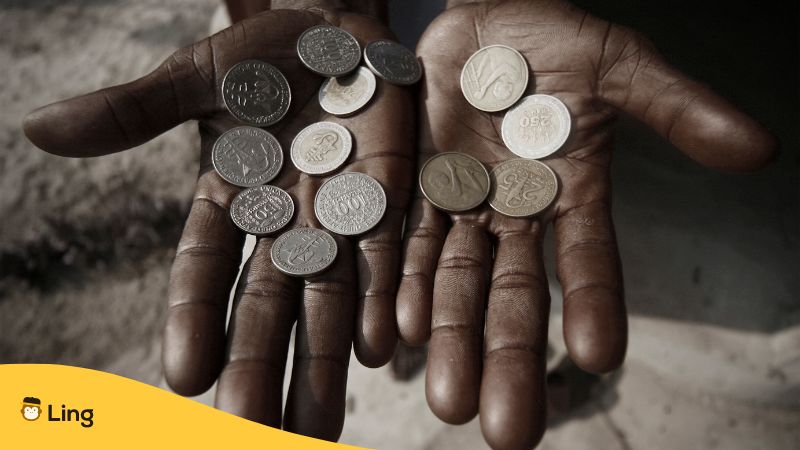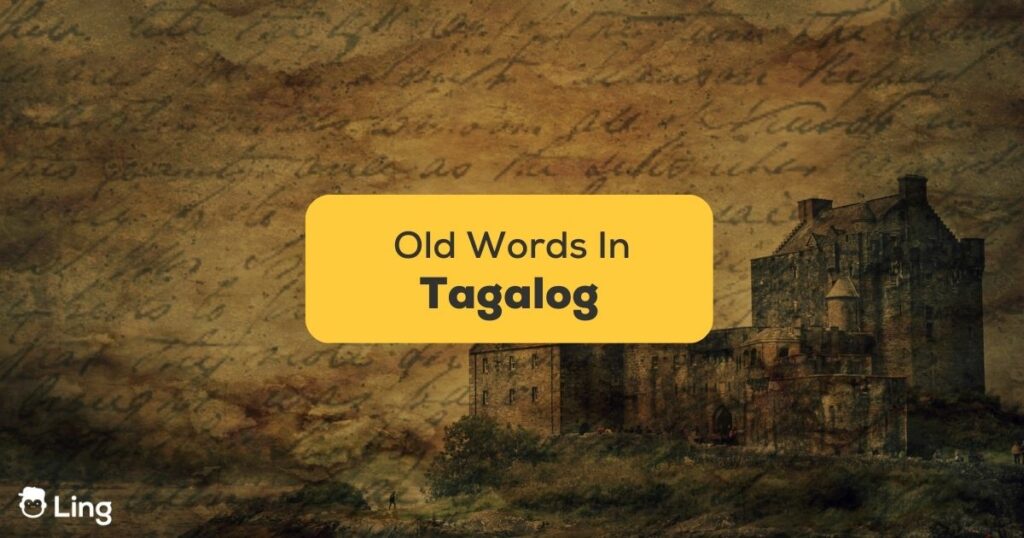Wondering why some of the Filipino words do not seem to make any sense? Buckle up and get ready for a mind-blowing exploration of 10 awe-inspiring sinaunang Tagalog terminologies cherished by native speakers. Let’s dive right in and let the old language of the Philippines sweep you off your feet!
Language is a fascinating reflection of society, and diving into the world of old Tagalog words is like unearthing a time capsule of our ancestors’ thoughts and emotions. As I delve into these incredible terminologies, I can’t help but be amazed at how language encapsulates the essence of a culture. It’s like peering through a bintana or window into the past, where every word carries the weight of history and the richness of tradition.
As a Filipino myself, I can’t help but feel a sense of connection to my roots whenever I hear locals saying these old Tagalog words. They remind me of the shared experiences and values that shape us as a community. They evoke images of laughter and tears, love and heartache, and all the beautiful complexities that make us human.
Want to learn the most beautiful Filipino words used by the older generation? If yes, keep reading below!
Old Tagalog Words
1. Nais
Nais encompasses more than just a simple “want.” It carries a profound sense of desire, longing, and yearning. It’s like the Tagalog equivalent of having a burning passion for something.
Example sentences:
- Nais kong kumain ng masarap na pagkain.
I want to eat delicious food. - Nais ng bata na magkaroon ng malaking teddy bear.
The child wants to have a big teddy bear. - Nais mo bang malaman kung ano ang sikreto ng tagumpay?
Do you want to know the secret to success?

2. Wangis
Ever wished you had a word that perfectly describes the resemblance between two things? Look no further. Wangis is the old Tagalog term that captures the essence of likeness, similarity, or resemblance.
Example sentences:
- Ang bahay na ito ay may wangis ng tradisyunal na arkitektura.
This house has the resemblance of traditional architecture. - Ang kagandahan ng lugar na ito ay may wangis ng isang paraiso.
The beauty of this place resembles a paradise. - Ang boses niya ay may wangis ng isang anghel.
Her voice bears a resemblance to an angel.
3. Tila
When you’re trying to express uncertainty or make a comparison, tila comes to the rescue. It’s like saying “seemingly” or “as if,” adding a touch of intrigue and mystery to your statements.
Example sentences:
- Tila naglalaro ang mga bituin sa langit sa ganda ng gabi.
The stars seem to be playing in the beauty of the night. - Tila lumulutang ang musika sa himig ng kaniyang tinig.
The music seems to float in the melody of her voice. - Tila bumubukas ang langit kapag umuulan ng malakas.
The sky seems to open up when it rains heavily.

4. Batid
Imagine having a word that means more than just “to know.” Batid embodies the deep understanding and awareness of something. It’s like having profound knowledge and insight that goes beyond surface-level understanding.
Example sentences:
- Batid ng lahat na ang kahalagahan ng edukasyon sa pag-unlad ng bansa.
It is known by everyone the importance of education in the progress of the country. - Batid niya ang kalungkutan na dinaranas ng kanyang kaibigan.
He understands the sadness being experienced by his friend. - Batid ng pamilya ang kahalagahan ng pagkakaisa sa mga panahon ng pagsubok.
The family knows the importance of unity in times of trials.
5. Sapantaha
This word takes intuition to a whole new level. “Sapantaha” refers to a gut feeling or a hunch that seems to come out of nowhere. It’s that instinctive sense that guides you in making decisions or predicting outcomes.
Example sentences:
- Sapantaha ko na siya ang magwawagi sa patimpalak na ito.
I assume that he will emerge as the winner in this competition. - Sa kawalan ng sapat na impormasyon, lahat ng ating mga sinasabi ay puro sapantaha lamang.
In the absence of sufficient information, all our statements are merely speculation. - Sapantaha ko, papunta na siya rito base sa kanyang mga sinabi.
I speculate that he is on his way here based on what he said.

6. Piitan
If you’ve ever felt confined or trapped by circumstances, piitan perfectly captures that feeling. It’s the sense of being in a tight spot, struggling to break free from the pressures and constraints that surround you.
Example sentences:
- Ang mga bilanggo sa piitan ay sumailalim sa rehabilitasyon para sa kanilang muling pagbabago.
Prisoners in detention undergo rehabilitation for their reformation. - Ang piitan ay dapat maging isang lugar ng pagbabago at pag-aaral, hindi lamang parusa.
Prison should be a place for change and learning, not just punishment. - Ang pagsunod sa batas ay makakapag-iwas sa pagkakakulong sa piitan.
Complying with the law can prevent imprisonment.
7. Pabalat
Prepare to be amazed by this word’s versatility. Pabalat can mean both a book cover and the first layer of cooked rice in a pot. It’s incredible how a single word can encompass such diverse meanings!
Example sentences:
- Ang pabalat ng aklat ay nagpapakita ng kahalagahan ng unang impression.
The book cover displays the importance of a first impression. - Ang pabalat ng libro ay maganda at makulay.
The book cover is beautiful and colorful. - Ang pabalat ng libro ay may magandang disenyo.
The book cover has a beautiful design.

8. Lagda
Are you familiar with that satisfying feeling of signing your name on an important document? That’s precisely what lagda represents. It symbolizes the act of affixing your signature, leaving your mark on a significant piece of paper.
Example sentences:
- Hindi maaaring maging legal ang kasunduang walang lagda ng mga partido.
An agreement cannot be legally binding without the signatures of the parties involved. - Ang lagda niya ay nagpapatunay na siya ang pumirma sa kontrata.
His signature serves as proof that he signed the contract. - Humingi ng kopya ng dokumento na may kasamang lagda ng may-ari.
Request a copy of the document with the owner’s signature.
9. Lumbay
This word encapsulates a profound sense of melancholy and sorrow. It’s like a bittersweet sadness that lingers in your heart, evoking emotions and memories of loss or longing.
Example sentences:
- Naramdaman ko ang lumbay nang mawala ang aking alagang aso.
I felt sorrow when my pet dog passed away. - Sa gitna ng lumbay, naghanap ako ng mga paraan upang mabawasan ang lungkot.
In the midst of sorrow, I sought ways to lessen the sadness. - Hinaharap nila ang lumbay nang may tatag at determinasyon.
They face sorrow with strength and determination.

10. Maralita
When you come across a word that describes the feeling of extreme poverty, destitution, or misery, it’s hard not to be moved. Maralita paints a vivid picture of the struggles faced by the less fortunate, creating empathy and awareness.
Example sentences:
- Maraming maralita ang naninirahan sa mga informal settler communities.
Many impoverished people reside in informal settler communities. - Pinag-ibayo ng organisasyon ang mga programa para sa edukasyon ng mga anak ng maralita.
The organization intensified the programs for the education of the children of the underprivileged. - Ang pagsugpo ng kahirapan ay isa sa mga pangunahing tungkulin ng pamahalaan upang tulungan ang mga maralita.
Alleviating poverty is one of the primary responsibilities of the government in aiding the impoverished.
Now that you’ve been introduced to these incredible old Tagalog words, it’s time to embrace their beauty and share them with the world. Let the richness of the Filipino language captivate you as you explore more linguistic gems like these.
Want To Learn More? Try Ling!
Now that you’ve discovered the wonders of old Tagalog words, it’s time to take your language skills to the next level. If you’re inspired to learn Tagalog or want to expand your vocabulary, we have the perfect resource for you: Ling!
Ling is a comprehensive language-learning app that offers an immersive and interactive experience. Whether you’re a beginner or looking to enhance your existing Tagalog skills, Ling has got you covered. Here’s why it’s the best resource to embark on your Tagalog language journey:
- Provides engaging, dynamic lessons covering vocabulary, grammar, pronunciation, and more
- Offers instant access to a vast library of words and phrases, including essential old Tagalog words
- Comes with interactive exercises, advanced immersive features, and quizzes to reinforce learning
- Helps you easily monitor achievements and track progress
- Give you a chance to gain a deeper understanding of Filipino culture and traditions.
Ready to give this a try? Master the Filipino language today with Ling by downloading it from the App Store or Play Store!



































































